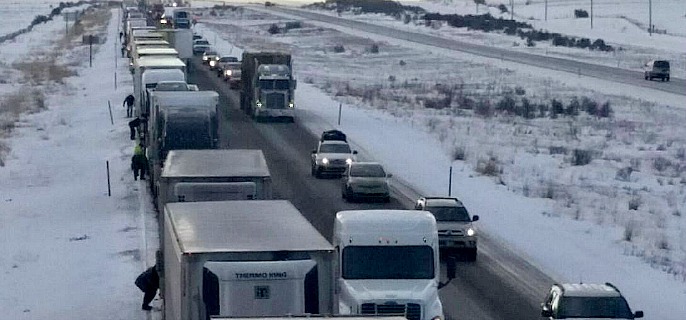
PHOTO COURTESY OF ODOT
Winter in Eastern Oregon typically means drivers of commercial trucks and other vehicles can expect to install tire chains at times.
At a minimum, vehicle operators need to have appropriate tire chains available and be prepared to install them when conditions warrant and when the chain requirement signs are activated. When installing tire chains, commercial truck drivers are encouraged to use the designated chain up areas and not to stop along the highway shoulder unless absolutely necessary.
“During a recent storm event when chains were required there were two miles of trucks parked along the shoulder and in the travel lanes, while a designated chain up area directly ahead of them sat nearly empty,” said ODOT District 13 Manager Ace Clark.
Over the past several years ODOT has constructed or improved numerous areas designed for commercial trucks to install or remove tire chains. These sites include extra wide shoulders with signage advising they are for truck chain activities only and not for parking. Many of the sites also have overhead illumination for improved safety.
“By not using the chain up areas, vehicles are blocking traffic and creating a safety hazard,” Clark said. “We have already had a couple crashes and road closures this winter due to trucks stopping in travel lanes to install chains or pulling out in front of traffic. The chain up areas were built to increase safety for chain up operations and it is a shame to see them underutilized.”
All motorists are also advised to be extra cautions around areas where people are chaining up. Please slow down and be mindful of those on the ground installing chains, and be prepared for vehicles pulling back into traffic. The road surface is likely slick, so stopping distance will increase. Sudden braking or turns to avoid vehicles and people could result in a crash.
Oregon’s road and weather website TripCheck.com includes information on snow zones and chain requirements. Most snow zones areas along the interstate in Oregon have designated chain areas for commercial trucks located a short distance from chain requirement signs. Truck drivers are advised to watch for signs that indicate “chain-up area ahead” and use these safety zones for chain-up activity. Stopping in the travel lane to install chains can lead to crashes, which quickly close the route for all travelers.
“The logic behind the chain requirement signs is that drivers would read the message, understand the chain-up requirements, and pull past the sign into the designated chain-up areas,” Clark said. “In most cases drivers are stopping on the narrow freeway shoulder prior to ever reading the chain up condition sign. Being out of your vehicle on the ground performing chain operations adjacent to traffic moving on slick roadways is dangerous enough. Please use the designated chain–up areas when they are available.”
Know Before You Go: Visit www.TripCheck.com for the latest real-time traffic updates, road conditions, snow zone information, chain requirements, highway cameras and more. By phone call 511 or 800-977-6368.










